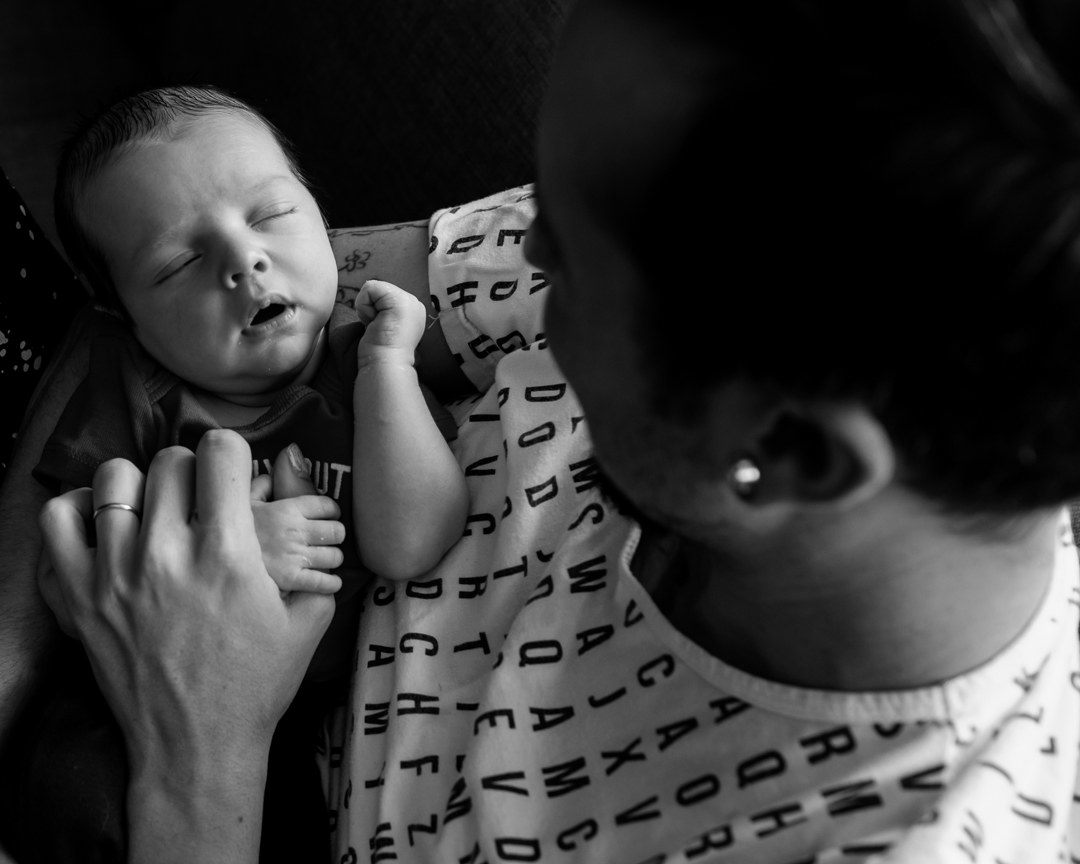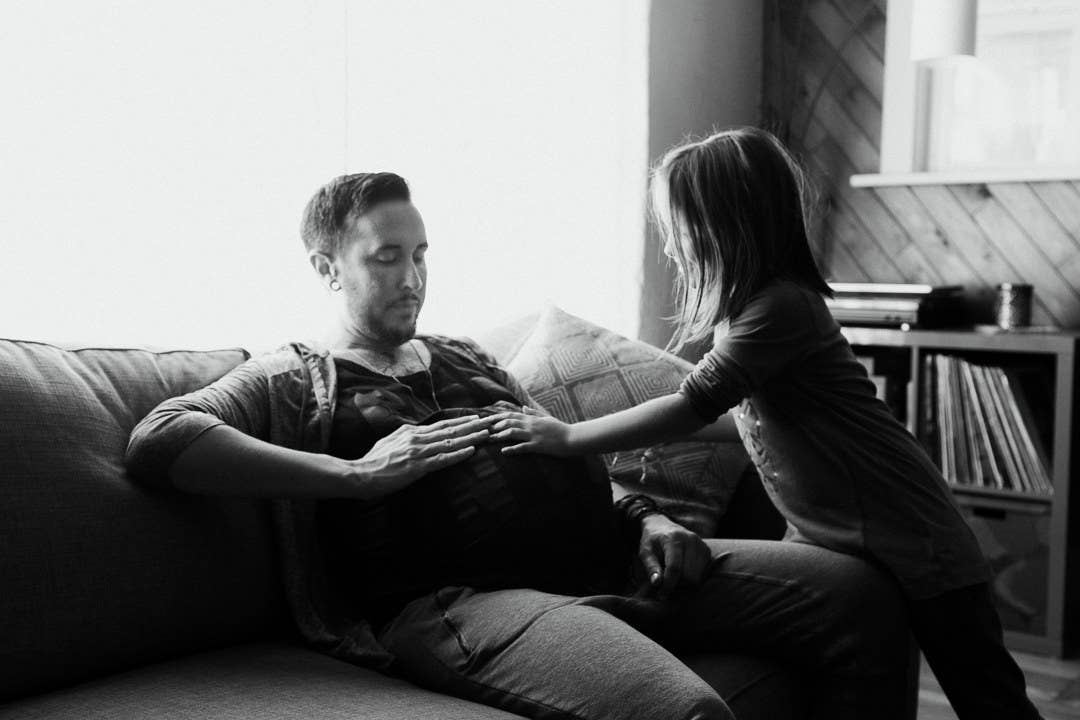
"I thought I would be fearless. Who cares that I’m a pregnant man? Fuck it! But I was actually really scared of being hurt or attacked. All my radical, queer, devil-may-care attitude dissipated because every part of my body was dedicated to keeping this baby safe and keeping me safe."
For the past four years, Trystan Reese has lived in Portland, Oregon, with his husband, Biff Chaplow and their two adopted children (Chaplow's biological niece and nephew). Their day-to-day lives are, for the most part, textbook ordinary — school, work, playdates, grocery-store run, repeat. The kids call Trystan “Daddy” and Biff “Dada.”
Recently, Trystan and Biff began to discuss the idea of expanding their family. Trystan, a 34-year-old trans man, would carry the couple's first biological child. After Trystan got pregnant, the couple made the decision to share part of their journey online, but they did not plan on their story going viral. While a trans man carrying a child is by no means a medical miracle, and Trystan is certainly not the first to do so in the public eye — think Thomas Beatie on Oprah in 2008 — their story has still attracted attention, both negative and positive.
We visited Trystan and Biff at their home in Portland when Trystan was nine months pregnant — on his due date, in fact — to hear more about why they chose to share their story online, what it means to be a trans parent, and what the future holds for queer families like theirs. The following account has been collected from various in-person and phone interviews leading up to the birth of Trystan and Biff’s son Leo. Responses have been edited for length and clarity.
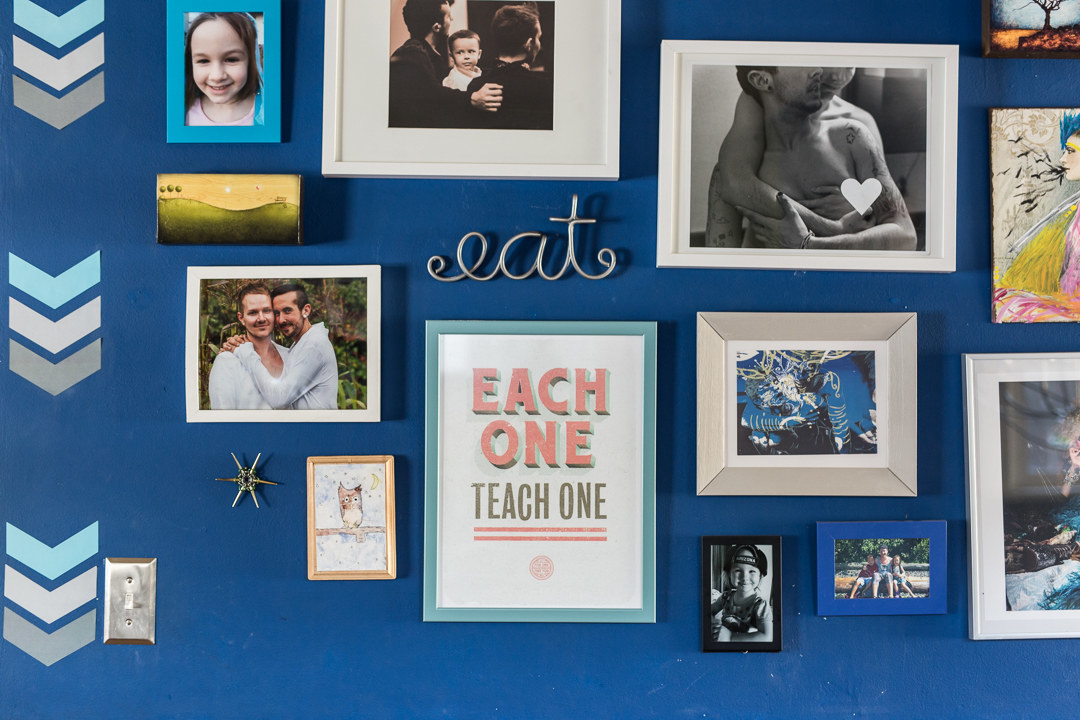
Trystan: In 2010 I met Biff. We were both really involved in the LGBT community; me on the more political organizing side and Biff on the more social and economic justice side. We met at a trans community brunch hosted by a mutual friend (Biff being the only non-trans person at the brunch). My trans radar is pretty finely tuned, so it wasn’t a surprise. I was interested in him from the second I saw him. He was not at all interested in me at first — partially because, as I would later learn, I had food stuck in my teeth. I know, I can’t be bitter at my friends anymore because it all worked out, but come on.
Ever since, I don’t think we’ve spent a night apart, aside from work travels. There’s never any need to. We wanted to do this right, having made a lot of mistakes in past relationships.
We waited a year to move in together, but three months after moving in we got the phone call letting us know his sister’s kids were going to go into foster care if we didn’t take them and...could we take them? It had been a year coming — we knew their situation wasn’t stable. Biff was basically Mom Jr. growing up, helping raise his siblings. He wanted us to be able to have this time where we still had independence and freedom, but this phone call came, pretty much saying if we didn’t take these kids, his sister wasn’t going to be able to get them back. We’d probably never see them again. The answer seemed very clear to me: Of course we would do this.
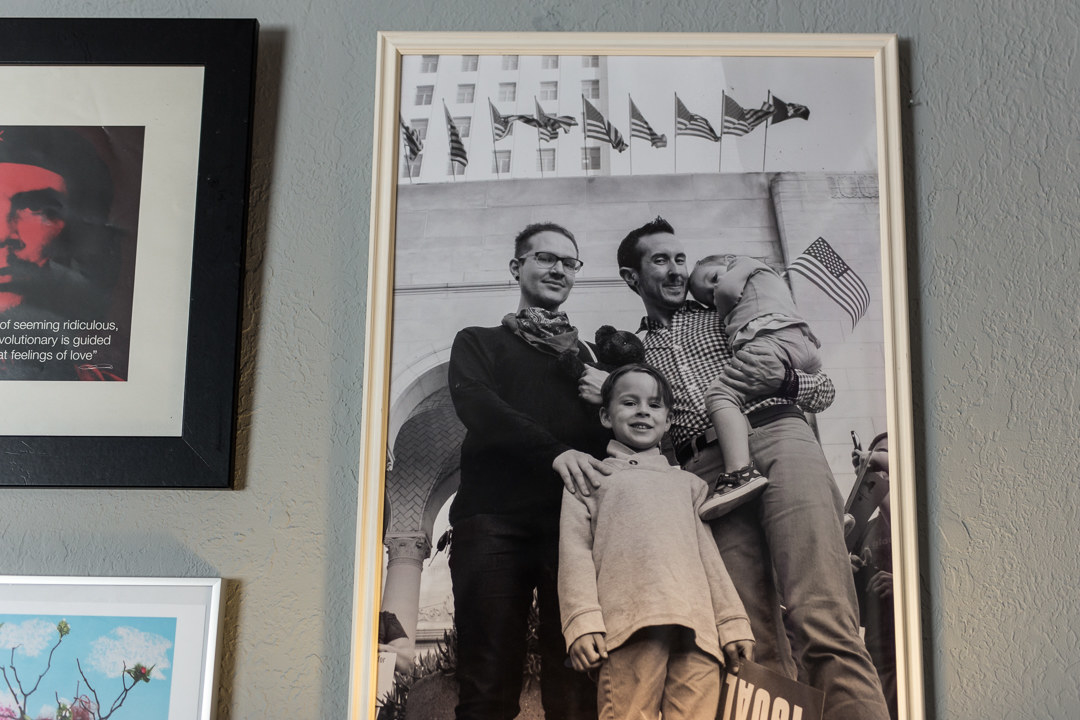
This was way bigger than us getting married — this was an 18-plus-year commitment. We’ve had them in our lives for five years now, six in September. We celebrate our family day every year, the day they came to live with us. It's one of the days they can ask us questions, we can be together as a family. Every year they have different questions about that, so we want to make sure the questions and conversations are always developing along with them so they can understand.
The kids are so enmeshed into our lives and into our identity now as fathers. I can’t imagine things going any differently. I had moments of doubt, where I thought, Can we undo this decision? Maybe I should be the fun uncle, not the dad. But Biff and I balance each other out — when I’m unsteady, he guides me back to the path. I don’t know if I would have known I had chosen so well in a partner if all this hadn’t happened to us. There is nobody better suited for me, better suited to be with me on this journey with me, than he is.
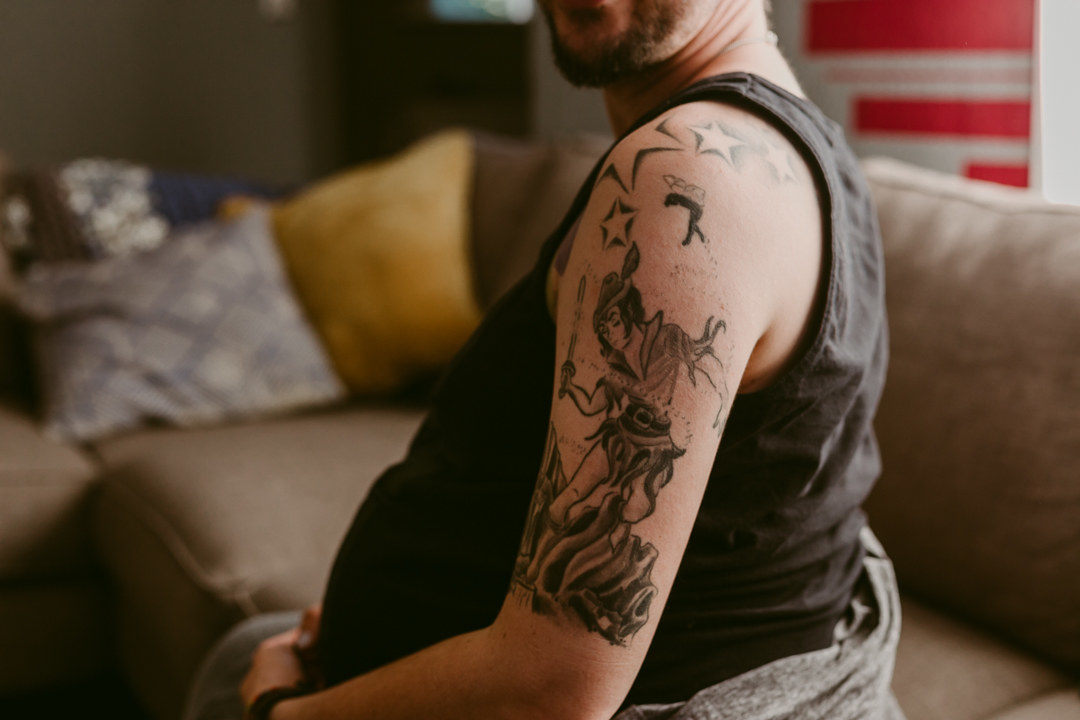
I have a huge Peter Pan tattoo on one of my arms. That was always my thing: Never grow up. When I transitioned — that was 14 years ago now — when I first started taking hormones I never wanted to get married, period. I didn’t want to own a house, I didn’t even want to own a car! I always wanted to be footloose and fancy-free. It wasn’t until a few years ago that I realized I was ready for what’s next, to be partnered with someone or someones.
I thought I was giving up having a family — I didn’t even think of it as an option. I didn’t ever dream of having, or wanting to have, a biological child. One, I didn’t think it would be possible, and two, it took a long time for me to be strong enough in my identity as a man to be able to do that. And I wouldn’t want to just have a child — I want to have Biff’s child. It wasn’t until I met him that I finally understood what all those straight people are talking about. I definitely teased my sister when she had kids. Why do you want to have kids? Why is your DNA so special? And now look at me. And it’s not even my DNA that’s so special, it’s his.
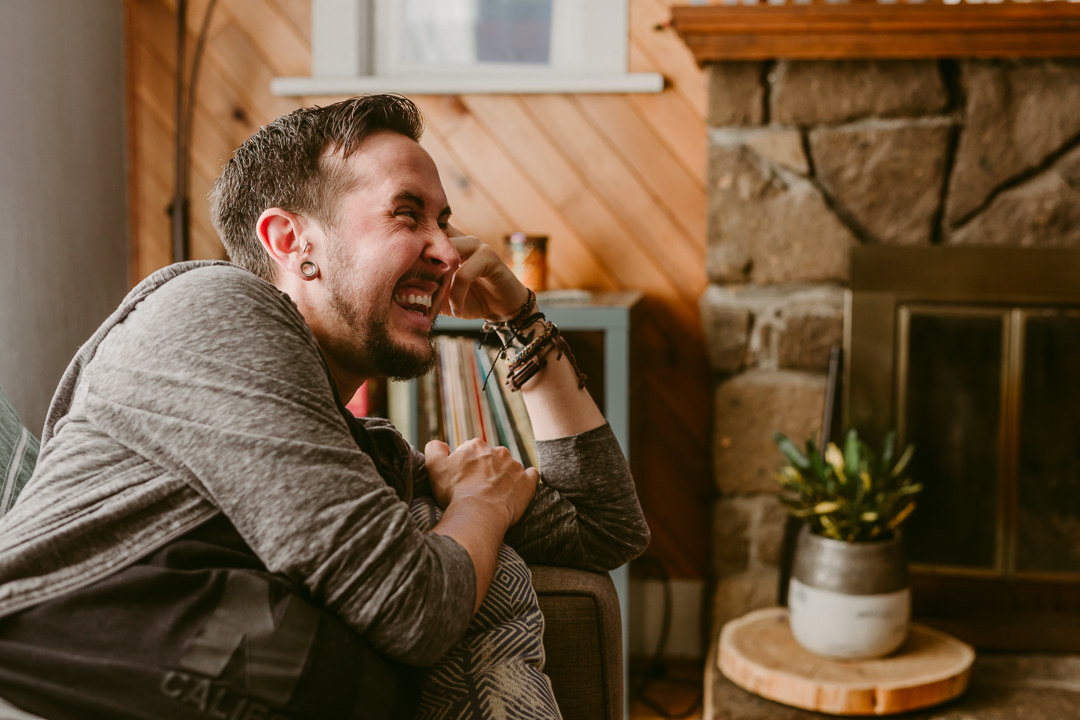
I wanted to make sure I understood the medical side of it — I didn’t want this to be an experiment.
Since I met Biff, I had started to have thoughts of, What if we had a baby together and I carried? But our other kids came along so quickly before we could discuss it. That took over our entire lives and became the central focus for years. It wasn’t until the adoption was finalized, about two years ago, that it felt like the dust from all that had settled. Now, I thought, We can build our life the way that we want.
I became really consumed by this idea of having a baby. I let it sit for a long time and I really thought about it, doing research. We know a lot of other trans men who have had babies, who have done so very responsibly under medical supervision, and their pregnancies have been happy and healthy. I wanted to make sure I understood the medical side of it — I didn’t want this to be an experiment.
I said to Biff, "I wonder what you would think about us having a baby, a biological child that I would carry?" Initially, he said no. He thought it was the dumbest idea in the world. He was worried about my personal safety. On the other hand, our kids had finally gotten to an age where we could sleep in until 8 in the morning — why would we start over from scratch? Dear lord, why would we ever do that.
We both took some time to think about it, and in a couple months he came to me and admitted he did some soul searching. If it was something I wanted to do, he was open to exploring it.
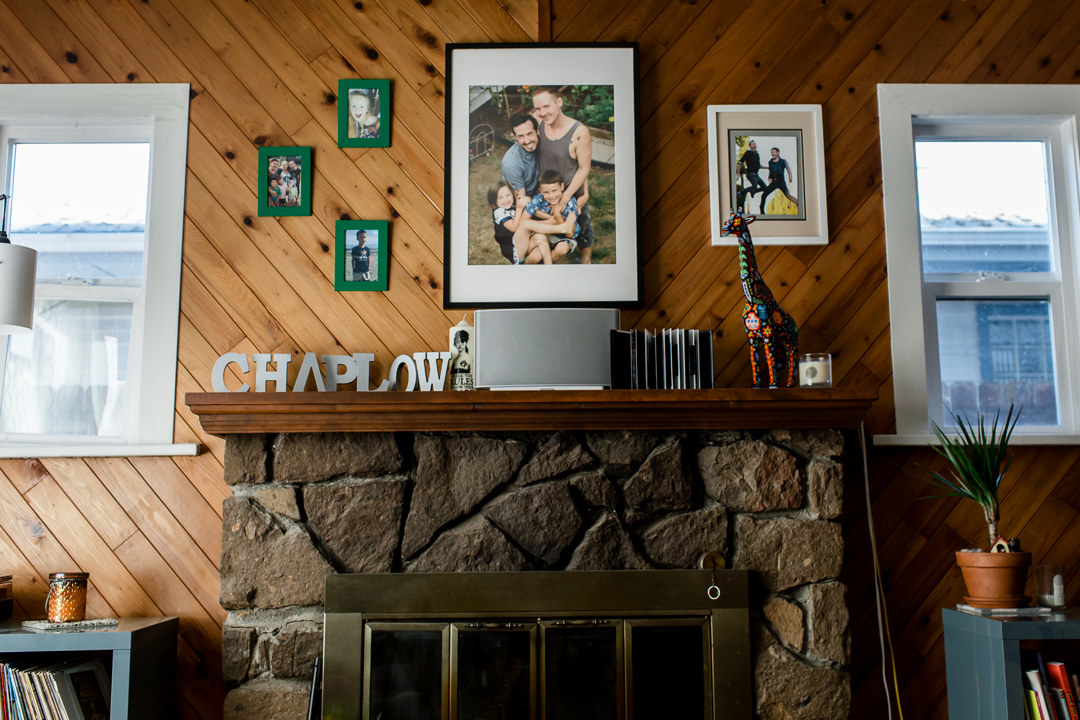
I went to a pregnancy specialist here in Portland that my insurance happened to cover. I discussed it with them, they ultrasounded all my parts, and they came to the conclusion that this wouldn’t be too different from women who have been on hormonal birth control and had stopped their cycle for years. I needed to stop taking testosterone to have a few normal cycles, and the difference would be pretty minimal between me and a woman attempting to conceive. So I stopped taking hormones.
The first time we conceived I didn’t know I was ovulating, and instead of my cycle coming back I got pregnant right away. Which is not uncommon, as it turns out; the first time you ovulate after a long time you can hyper-ovulate, which ups your odds even if your body isn’t ready yet to carry a baby to term. That pregnancy only lasted a few weeks.
The nurses and doctors let me know that 1 in 4 pregnancies end in miscarriages, so this wasn’t any reason to be discouraged. Every fiber of my being felt we needed to start trying again — today. But it spooked Biff. Going off hormones meant huge mood swings and challenges for me emotionally that he had to navigate. All the while, we were parenting two other kids, trying to show up for them and be good parents. It was a lot. He said it was too much, that we should wait a year. Hearing him say that sent me into a panic. But I trust him, and if he wanted us to wait a year, we should wait a year. Having a baby wasn’t as important as us being in a healthy relationship.
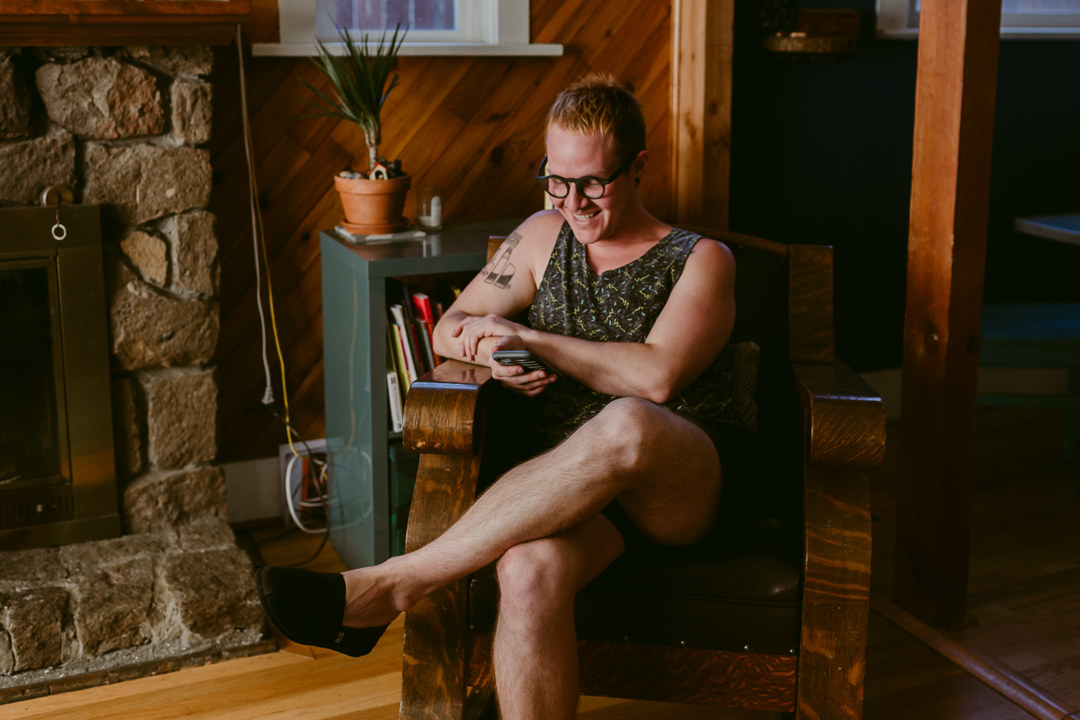
I know that hormones play a part in our personalities, but I thought, I’m an adult. I know how to manage my emotions and reactions. I seriously underestimated the effect that hormones and the balance of hormones in one’s body and brain affect your personality and the way you interact with the world and respond to things. It was terrible. It wasn’t terrible from a trans perspective — it was terrible from a human’s perspective. I didn’t feel unregulated from my gender, it was just that little things bothered me so much more! I was getting in horrible moods for reasons that I couldn’t explain. It was really difficult, and I pride myself on being a good parent and a good partner, but those things were so much harder when my hormones were all wonky.
We then actively tried not to get pregnant, but quickly realized it would be hard for me to be off hormones for a year, or to go off and then go back on.
I’m meeting with a medical team tomorrow to find out how soon after the pregnancy I’ll be able to go back on hormones. Sometimes testosterone helps the body heal faster. If I don’t have a C-section I should wait longer, but if I do it could be helpful to get back on. My goal is to go back on hormones as soon as possible. It’s something I’m very much looking forward to.
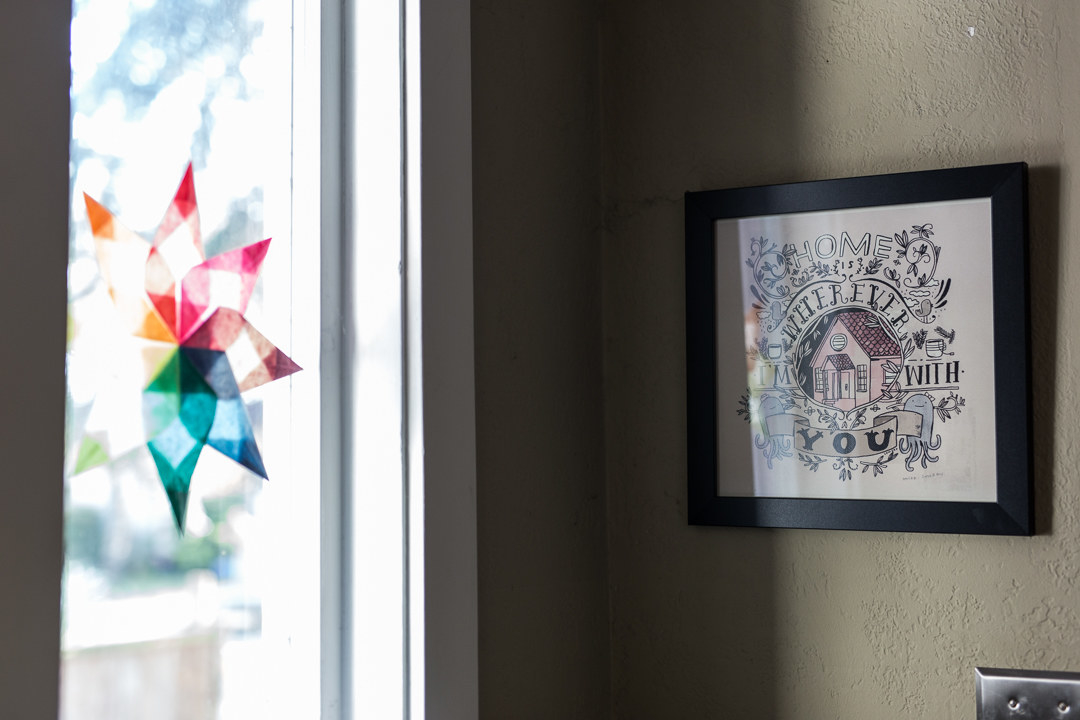
It was a big and very conscious decision to share our story publicly online. There are certain things we won’t share, period. We are also selective about who we give our story to. Piers Morgan offered to interview us and we said no; that’s a conversation that’s going to be rooted in defending our right to exist and we’re not interested. What we looked at was the landscape of the trans movement and trans acceptance in our culture today. Would telling our story help move the conversation forward? Do we have the opportunity to broaden and expand what it means to be trans in America today? Will it be too provocative and drive people away from trans acceptance? Are people ready for us?
Ten years ago, when Thomas Beatie came out [as a trans man who was pregnant], I don’t think the public was ready. I think his story did more harm than good. I was a young trans person at the time and I remember being so angry with him: People are not ready for this, why did you do this to us?
Now we look at Laverne Cox, Janet Mock, and people really pushing for trans acceptance and celebration. We thought we had the chance to do some good here. The whole reason I wanted to be more public was because I’m ready for the next trans narrative. This idea that to be trans means that we hate our bodies, that we wish we weren’t born in the bodies we were given, that we want to be just like non-trans people or the gender we’re transitioning to — that’s just not true for a lot of us. We’re delighted with who we are. It’s true for some trans people, but not for all of us.
Do we have the opportunity to broaden and expand what it means to be trans in America today?
Shockingly, the most backlash we’ve had has come from within the LGBT community, from the more radical left. People have said we should stop gendering our baby. He’s male, it’s a boy, and we’re giving him a more traditionally masculine name. Nothing is good enough. How much more of a risk do you want us to take? How much more unsafe do you need us to be? I am trans, I am a pregnant man, I have thought about this. This is not something we’re doing because we believe in the gender binary — but statistically, we will probably have a boy-identified child. Being trans is still rare; he probably won’t be trans. We aren’t trying to make things harder for him or ourselves on top of everything that’s already going on. Being gender neutral is also a choice he is equally likely to be unhappy with than if we picked a gender he is not in alignment with. I certainly survived and thrived being raised with certain gender norms and having to adjust and adapt. I don’t feel like it was the worst thing that could have happened to me.
Everyone feels the right to their opinion and to share it with us. The hateful messages are on a spectrum. There is "I don’t judge you, but you shouldn’t bring a child into the world when you know they’re going to be teased for being different." Which is shocking to me, because any oppressed person could hear that. How dare I bring a child into this world? I’m not going to stop living my life because everyone else is fucked up. That’s the most mild of the hatred.
Then, there’s the sexual stuff. "This is so hot, send me nudes." Oh god, no. Those are in that random, weird category where it’s just funny to me.
Then there is, "This is the rainbow people just trying to push their agenda."
And then there is the super-4chan, neo-Nazi, really scary, brutal, "You look like a circus freak," "I hope your baby dies" kind of stuff. "You’re a cancerous piece of shit."
I get those on a daily basis.
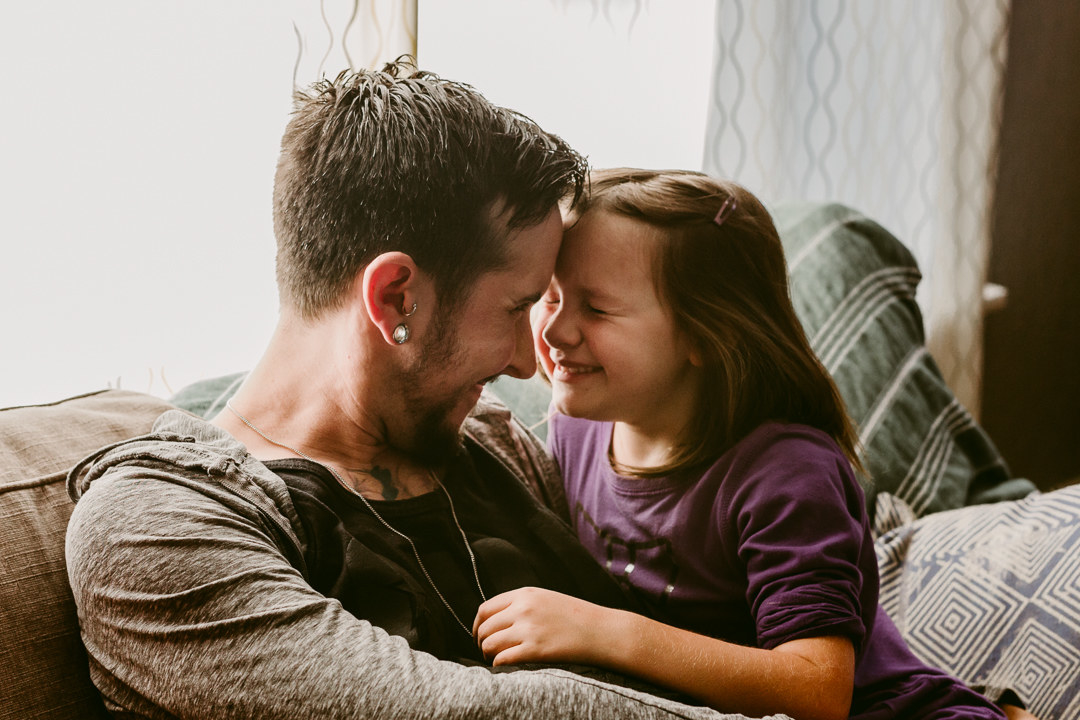
I have to train myself to not go there, to not read the comments. It’s a poison and it will absolutely get to me. The people in my life have helped sort through. I’m so lucky to have amazing allies in my life that help. Friends monitor my Facebook page and go through several times a day to delete hateful comments, ban people. So I never really have to see any of the comments anymore. If positive messages come through, they send me those. They send me the 15-year-old trans kid from Michigan.
There is nothing that people can say that I haven’t already heard.
I’ve been trans for more than a decade, which in the trans world is a long-ass time. I’m a trans elder at this point. The lifespan of trans people has never been particularly long. I have a very high level of resilience toward things that people say. I navigated the world of gay men as a trans guy; I’ve been through Grindr. People don’t say things out of malice — usually, it’s out of ignorance or curiosity. There is nothing that people can say that I haven’t already heard. I learned early on how to pick my battles and use my energy in the best way.
Biff: The more people that show support, that share our stuff with supportive messages, the more pressure there is on other people to take that seriously. There is a group of people that will treat it like a freak show no matter what.
Trystan: We’re not here for them. From the transgender community, I almost expected to get, "You’re making things harder for us. You’re confusing people." I expected way more of that, but that isn’t what we’ve heard. We’ve heard, overwhelmingly from LGBT people, "Thank you for expanding what it means to be a man, to be trans, to be a family."
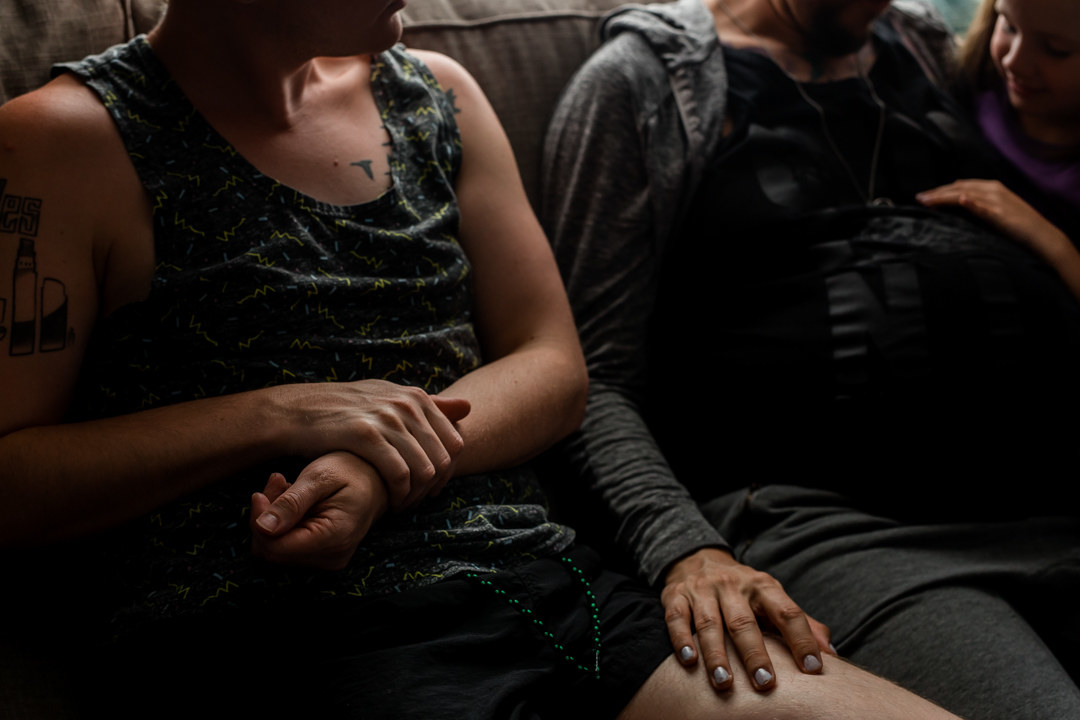
Trystan: I always underestimate how difficult something is going to be. Biff has a more realistic perspective. I was not visibly pregnant until seven months in and it was wintertime, so it was easy to put on a sweater, a scarf, and nobody could tell. Plus, no one is really looking for a man to be pregnant, so it was easy for me to hide. It wasn’t until recently it became, "Holy crap, that is a man that is pregnant!"
Your brain produces a bunch of anxiety hormones toward the end of pregnancy. It’s how you survived all the way back to Cro-Magnon man or whatever. But that really, really messed with me. I thought I would be fearless. Who cares that I’m a pregnant man? Fuck it! But I was actually really scared of being hurt or attacked. All my radical, queer, devil-may-care attitude dissipated because every part of my body was dedicated to keeping this baby safe and keeping me safe. That was super surprising.
Biff: There was a time when we decided Trystan would stop taking the train to work. This past month we’ve been pretty laid-back about going out in public, but I didn’t really worry too much about safety here. We’ve never had a negative comment in person out in public; we’ve been lucky. Online, obviously, it’s a different story. Some things you just have to ignore. You can’t look at it, can’t follow it, can’t read the comments. You have to ignore it because it’s an emotional trap — you get pulled in and it’s no good for anybody.
Trystan: The last few weeks of pregnancy are super hard anyway, so I don’t want to take the train. I’m working from home. At this point, I really just want to blend in, I don’t want to draw any attention to myself out in public. We did go out for Pride — we went to Trans March and the Pride festival. That was really wonderful because a lot of LGBT folks came up to us and mentioned they had read about our story, to thank us for being public. If I get coffee, the barista mentions they saw me on Facebook. This is Portland — a pregnant man is not the weirdest thing they’ve seen that day.
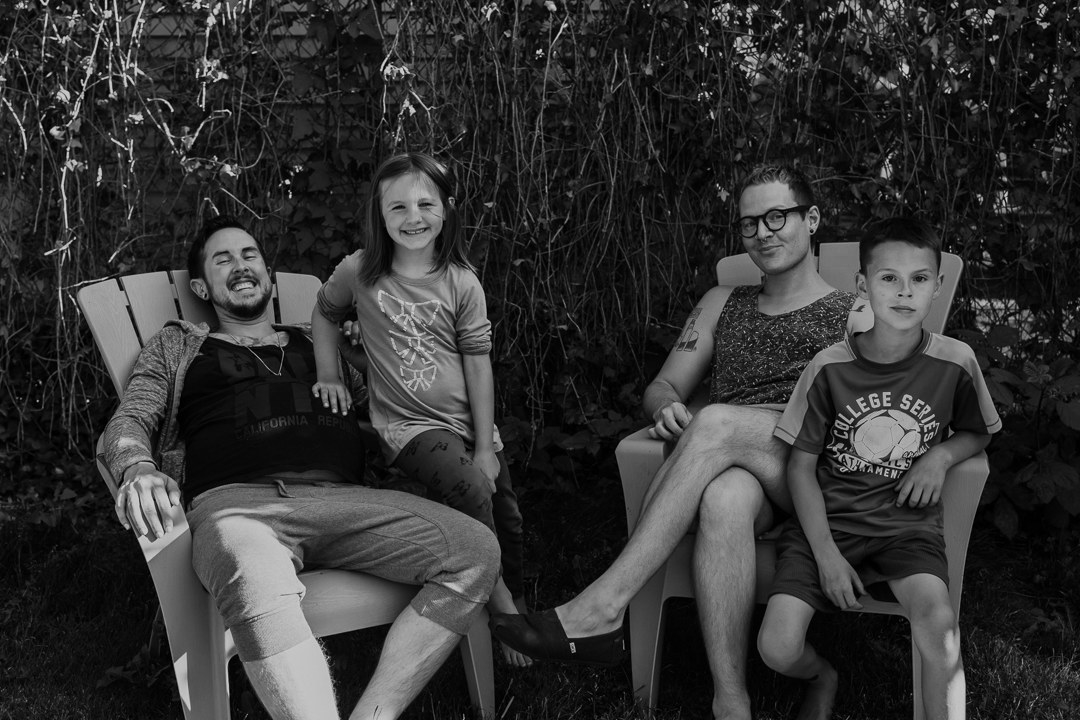
We’ve heard, overwhelmingly from LGBT people, “Thank you for expanding what it means to be a man, to be trans, to be a family."
Trystan: I’m Daddy, Biff is Dada. It’s also contextual. We know if the kids are asking about food, it’s Biff. "Dad, can I have a Popsicle?" That’s Biff. "Dad, can you come kick the soccer ball?" That’s me, that’s something I do.
The kids have other trans men and queer people in their lives who have kids. I’ll show them photos of my friend Jay who is having a baby. It’s sort of an ongoing thing we talk about. Hayley has always been really proud of our uniqueness as a family, loves to tell her class about her trans dad. That’s her personality. Riley is much more sensitive to feeling embarrassed or judged or shamed. He has asked us not to tell his friends at school; he wants to decide for himself who is going to be supportive and who isn’t — he’s a little older. We try to be respectful of that in our own limits and support him.
Biff: The kids are super aware of everything that is going on. We talk to them all the time about what it means to have a trans parent or a queer family. We don’t really share with them a lot of the negative side of that, we only let them know that people will think this is different but it’s OK to be different. Different doesn’t mean bad. They understand that and are on board with that.
Trystan: But certainly the baby will know his story. We are really proud of what we’ve done, of our family, this mosaic we’ve made from the clear pieces of glass queer people are handed.
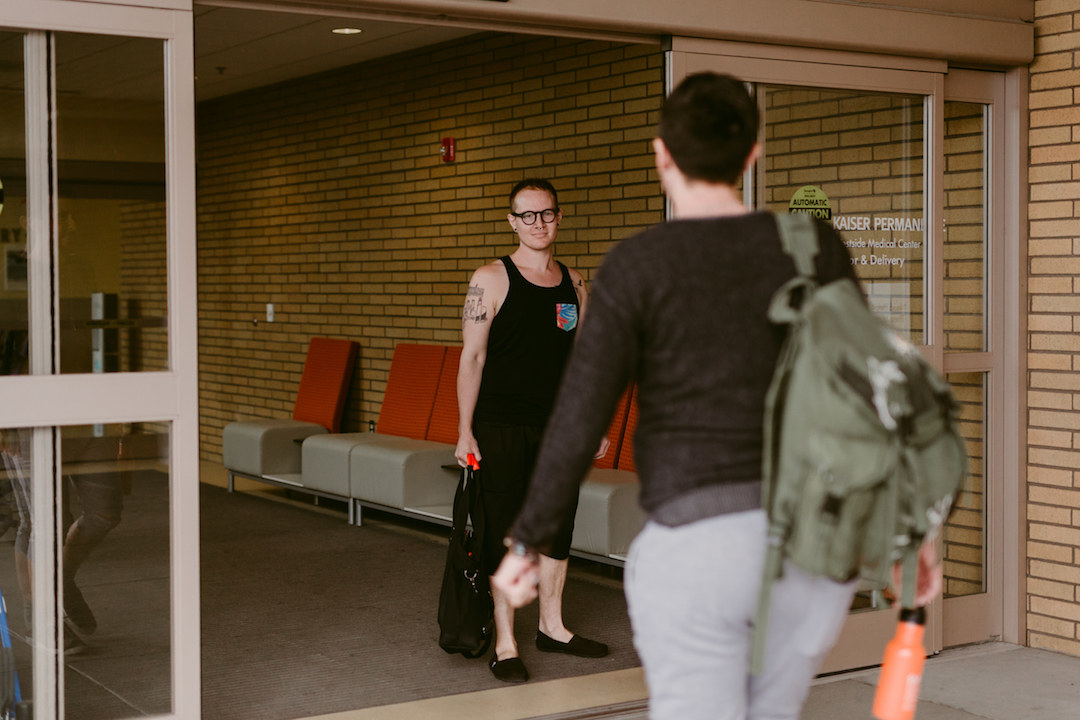
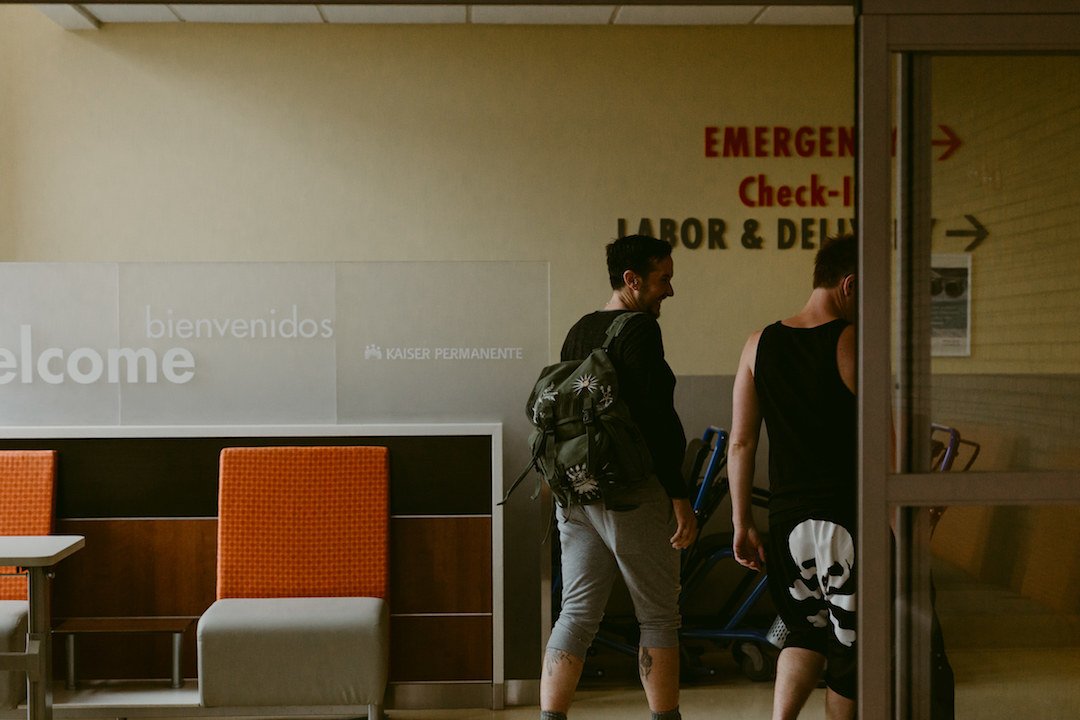
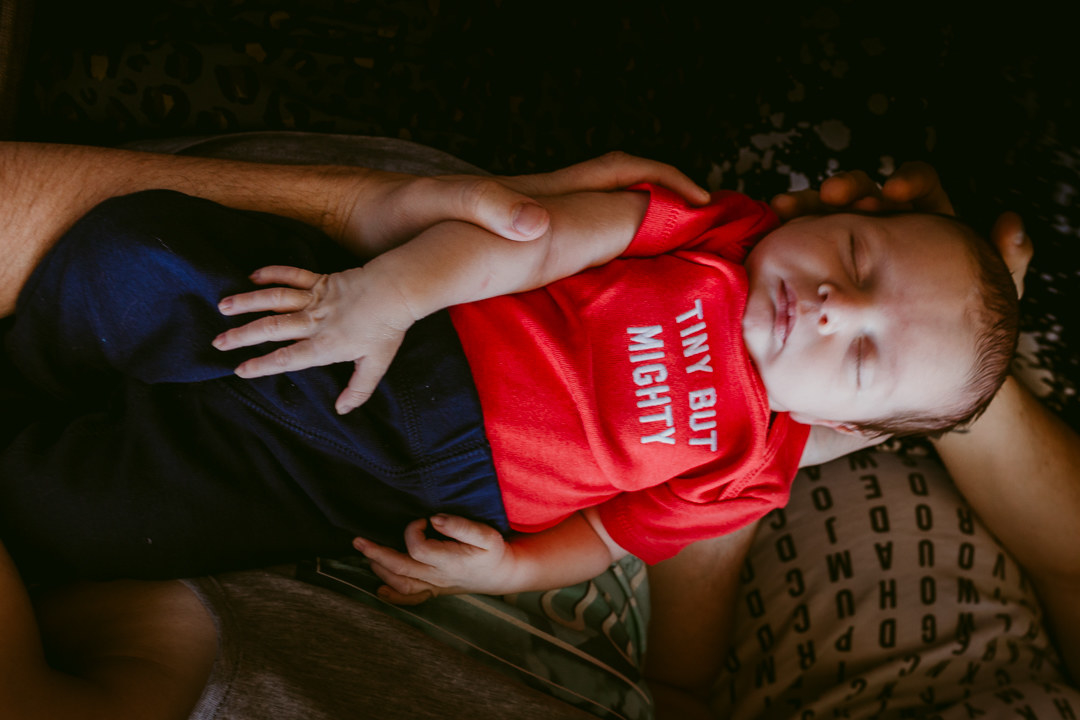
Trystan: If I am reading a book about the birthing process and it refers to women, mothers, wives — I’m the one who is doing something different here. I’m the one who is crashing the party after I left when I was 20 years old.
Biff: Most birth videos will feature women giving birth, most books will show straight parents. It’s my job as a parent to seek out resources that show different families and show those to my kids so they can see there are different types of families.
Most people are more fluid in their gender then they think that they are. There are so many connotations that come along with being a man or a woman, with being masculine or feminine. Everyone veers from those norms in some ways, and some veer more than others. You can call it what you want, but the truth is that we’re all better when we get to choose the things that we are best at and choose those roles, rather than the other way around — because you are a man or a woman, these are the things you’re supposed to do. That’s the nice part of being a queer family — I get to decide whether I want to fill that role for my family or not. I’m a better parent and partner because I’m choosing what I’m good at and letting Trystan fill in where he excels.
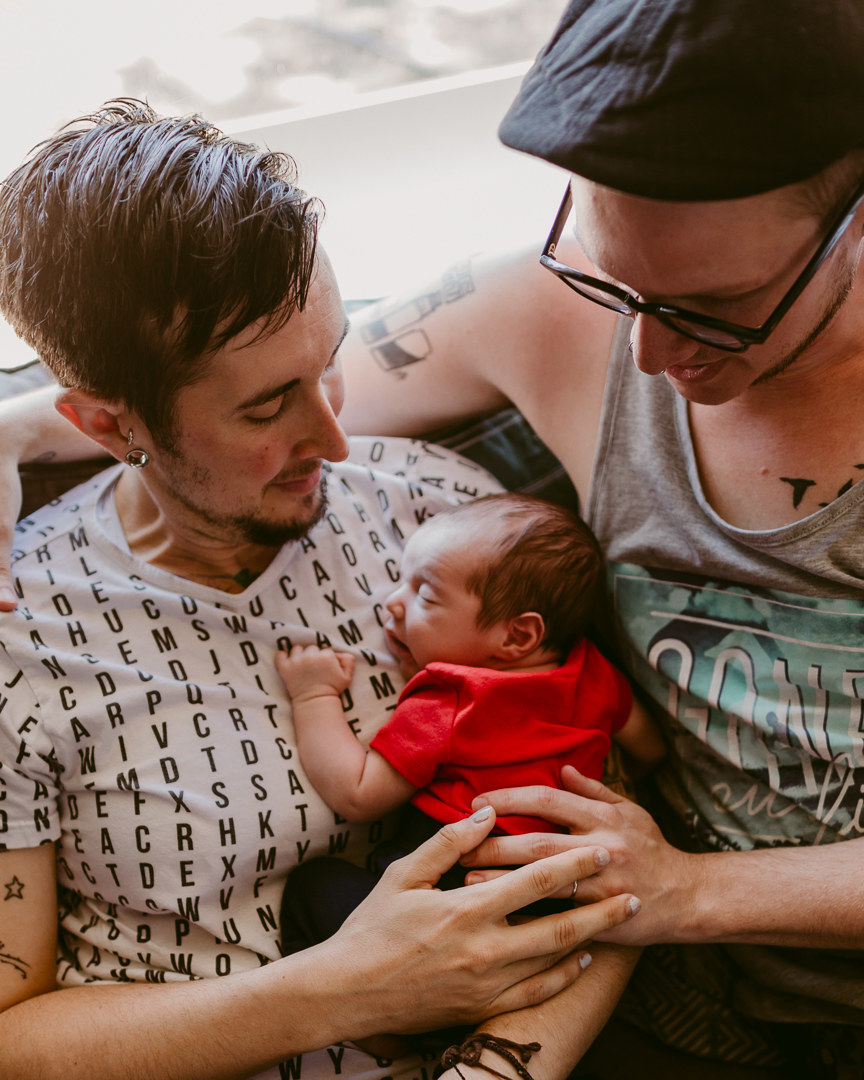
Most trans men don’t have the relationships with their body that would allow them to engage in something that still feels so rooted in femininity.
Trystan: People said pregnancy, especially the end, is very difficult — oh my god, it is so hard. My back hurts so bad, my skin is stretched. I will be thrilled when the baby is out of my body. What does he look like? What is his personality like? Is he OK in there? I have geeked out a lot on the science of pregnancy. What can their brains conceive of? Do they have a sense of consciousness? I’m eager and impatient to meet him, see him, and be in all of our lives.
I didn’t experience any dysphoria with my body during the pregnancy. I’m more interested in the science part — look what my body can do! Pregnancy doesn’t feel connected to womanhood or womanness to me.
I think trans men having babies will continue to be rare — though it certainly happens and we are nowhere near the first. Most trans men don’t have the relationships with their body that would allow them to engage in something that still feels so rooted in femininity. It’s something that their mothers did, their sisters did. I hope that some of that is social, that it isn’t an inherent part of being transgender. I hope more people will get to the place that I’ve gotten to from the support of the people around me. I hope the negative stigma around it lessens. People won’t say, “Well, you’re not really a man then.”
